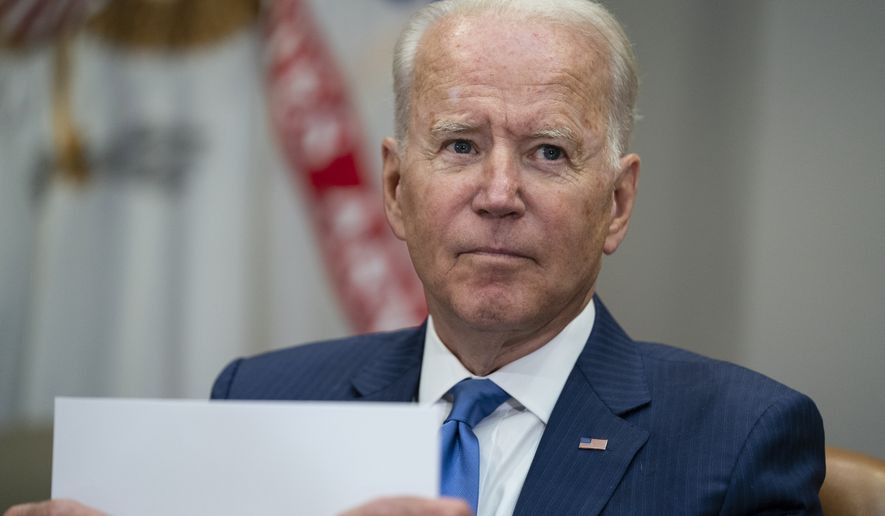Congressional Democrats are giving President Biden a pass when it comes to oversight and accountability, according to new research by a bipartisan think tank.
The Lugar Center, a Washington-based public policy institute, released a report Monday indicating that during the first six months of the new administration, oversight has been nearly nonexistent.
No committee within either the House or Senate, both of which are controlled by Democrats, has held more than three investigative oversight hearings since Mr. Biden took office.
The reason is likely political and threatens to upset the constitutionally ingrained balance of power between the executive and legislative branches.
“There’s a natural tendency, which we don’t think is good, for both Republicans and Democrats to not investigate thoroughly an administration of their own party,” said Jay Branegan, a senior fellow at the Lugar Center. “If government agencies are routinely scrutinized and called to account when they come up short, it’s good for everyone.”
More troublesome is that congressional committees are opting to remain quiet even as the issues over which they have purview explode into full-scale crises. Nowhere has this been more prevalent than when it comes to national security.
For instance, the House and Senate Homeland Security panels have in total only held four oversight hearings in the first six months of this year, even as the U.S. faces a burgeoning migrant crisis on its southern border and continuous ransomware attacks on vital supply chains.
“It is disappointing to see Democrats in Congress completely abdicate their oversight responsibility and refuse to hold the Biden Administration accountable to secure our border and protect the safety of American citizens,” said Rep. August Pfluger, Texas Republican and a member of the House Homeland Security Committee. “Their inaction and lack of accountability only harms the American people.”
An aide to the Democratic leadership pushed back on such assertions, arguing that congressional committees had little to investigate since the administration was not yet fully in place.
“Six months in and the Senate is still confirming nominees, we’re still dealing with the Jan. 6 imbroglio and, for the most part, the administration is focusing on designing its agenda,” the staffer said. “There isn’t that much that needs oversight.”
Critics, however, counter that oversight is needed more than ever, especially as Mr. Biden has empowered the federal bureaucracy to overturn policies and regulations put in place under former President Donald Trump.
The White House, in particular, has pushed to make tackling climate change a “whole of government agenda.”
As such, each department and agency has been told to find ways not only to reduce greenhouse gas emissions, but also mobilize the power of the federal government to end America’s reliance on fossil fuels.
Mr. Biden’s strategy was displayed recently when Treasury Secretary Janet Yellen announced the creation of a new “climate hub” within her department.
The office, which will be staffed with political appointees, is set to have wide latitude in pushing the federal government’s “financial resources” and tax policies to favor green-energy projects.
Republicans have argued the position could wind up pushing policies that discriminate against fossil fuel companies. Despite the warnings, neither the Senate Banking Committee nor its House counterpart has held an oversight hearing on the topic.
Neither committee returned requests for comment on this story.
Ethics watchdogs say that turning a blind eye to such concerns allows waste, corruption and mismanagement to fester and grow within the federal government.
“While it’s not surprising that there is little interest in oversight when the party in the White House and the party in control of Congress are the same, it’s no less disconcerting,” said Kendra Arnold, executive director of the Foundation for Accountability and Civic Trust. “The American people deserve transparency from its elected officials and right now they’re not getting it.”
Good-government groups also argue that Congress must reassert its oversight authority since the White House has proven a willingness to muddy ethical guidelines. They point to the recent controversy over the financial dealings of presidential son Hunter Biden as proof.
The younger Mr. Biden, who has a long history of profiting from interests connected to his father, recently sparked controversy for proposing to sell his artwork at auction.
Despite being a relatively new artist, Hunter Biden’s paintings are estimated to fetch between $75,000 and $500,000 on the market. The lucrative price tag has raised concerns that individuals and special interests will purchase the art to curry favor with the White House.
The administration has sought to allay those fears by crafting an arrangement with a New York art dealer to keep the names of bidders and buyers confidential.
“I think it would be challenging for an anonymous person who we don’t know and Hunter Biden doesn’t know to have influence,” said White House press secretary Jen Psaki.
Still many are unsatisfied with the proposal and believe the controversy is by no means settled.
“Unfortunately, Democrats and the biased mainstream media have no interest in pursuing the obvious lies, corruption and conflicts of interest inherent in the Biden family’s use of their name to sell access and peddle influence,” said Sen. Ron Johnson, Wisconsin Republican.
• Haris Alic can be reached at halic@washingtontimes.com.




Please read our comment policy before commenting.